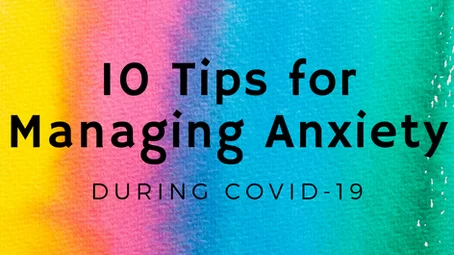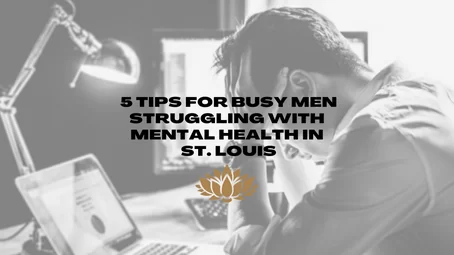I typed these tips in an email to a friend a few weeks ago who texted me saying “I need some tips. Anxiety and depression coming in hot.” After I had it all outlined and sent off, I thought to myself “wow, that would make a really good little email series. I could attach a video for some of the tips, going into more detail where necessary.”
Welp, it’s now been 2-3 weeks since that thought and I haven’t moved on it. I still think it would have been a great idea but in an effort to practice what I preach, I accepted some realities (lower energy levels, focus, and motivation), got rid of the pesky “but you should get it together and do that” (have the “shoulds” yourself? Here’s how to fight them a bit), and lowered my expectations so I could at least deliver the content in some format (and I REALLY like this content).
So you get a great blog post instead! Without further ado:
Here are 10 tips for managing your anxiety during the quarantine times of Covid-19.
1. Differentiate all of your emotions from one another.
Right now, they probably feel like they are in a huge, tangled up bundle. Which makes sense — there’s so much going on and many of us are struggling to find the time for anything “extra”. Your emotions might seem like they can fall in this “extra” column, but taking a few minutes to get clear on what they are will actually save you time — and energy! — in these quarantine times. Emotions to consider identifying:
- Anxiety
- Depression
- Fear
- Overwhelm
- Stress
- Grief
This is important because different emotions usually take different coping tools. Once you have identified the emotions you’re feeling during this time, take a few minutes to jot down 1-2 ways each emotion can be settled or calmed.

2. Take an honest assessment of your needs.
What needs aren’t being met? What traditional ways can you implement to meet those needs? What non-traditional/creative ways can be used to meet them? Which of these needs would be best served by tending to them daily? Which can be met just once or twice weekly? Start to create an agenda to ensure that those needs are *scheduled* to be met on their needed basis.
(Places to assess needs: physical; emotional; mental; social; spiritual)
Physical:
exercise/movement, touch, sleep, nutrition, hydration; for moms: am I getting enough time either away from being touch by my kids or am I able to find a place to decompress after a full day of being touched? For those living alone: can I think of something that might help me manage the loss of physical touch from my life?
Emotional:
am I allowing myself to feel my feelings? Am I observing those non-judgmentally? Am I able to cope with the emotions that feel negative? Is my emotional toolkit adequate to meet those needs or do I need to find additional tools?
Mental:
am I doing something to be mentally stimulated during this time? Do I have an activity—best if it’s a hobby—where I can go for all of my focus to be momentarily utilized by this activity? Where can I find even five minutes of mental “delight” in each day? Can I cope with my thoughts or do they create feelings of distress/discomfort?
Social:
am I getting enough contact with people outside of those with whom I live? Are there places I can do better to get that social outlet met? Do I have enough on my calendar to pull me out of the cycle of “it is only this 24 hours that matters”? In other words, even if it is a low bar, is there something I can schedule socially to look forward to? Where can I get creative? Where can I reach deeper into my contacts list to create more social time (hint: everyone is looking for more social time so reach out to that old friend, neighbor, roommate, teammate, or coworker!)?
Spiritual:
what do I believe in? Am I engaging in that belief system a) frequently enough and b) in a deep enough manner that it is serving my needs right now? Is there a place my social support network or the people I live with can engage with me to enhance my spiritual practice? Is there a way my spiritual practice needs to evolve to serve me better during this time?
3. Take turns with your partner so you each get to be gone from the house, or even from the kids, at least once a day but better if it’s twice.
Choose what time increments are best for you. You can drive, walk, or hide in your room. If you’re staying home, formally designate a space, even if it’s just a piece of furniture, as your “coping place” or “relaxing place.” Start to reiterate to your children that it’s a “time out” for you and they are not to disturb you while you are in that place.

If you live alone, also be away from your house at lease once, if not twice, a day. A great activity right now is going for a drive. Driving alone is normal for many people, so it can feel good to be in the car right now. Maybe drive to a different neighborhood than yours to walk somewhere different. Or go explore surface streets in your city. Drive outside city limits to a pretty part of your start. But just get out of your house every day. I also recommend you designating a space in your house that you can go sit quietly. It’s not a place to scroll on your phone or watch a show. You can read or journal, but I really recommend sitting quietly, even if it’s for 5 minutes. Your brain will thank you!
4. Have an open conversation with your partner, if you haven’t already, about the needs each of you have right now and what would be beneficial to get from the other.
Focus on clearly communicating not only what your needs are, but also the helpful response in that situation when you’re expressing that need or emotion. Set up a time you and your partner can revisit this conversation every week or two, particularly since the landscape of Covid-19 and quarantining is changing so quickly. Your needs will have an ebb and flow to them also. That’s normal. Expecting it can reduce surprise when that change does happen. Having a set time to communicate your reactions and needs after those changes will be really helpful to get through this in as healthy a way as possible.
If you live alone, call on a good friend or two, or a close family member, to help you with your needs. Ask someone to check in with you on “x” day if you’re finding a certain day of the week to be difficult. Or just be honest that you’re struggling. Your friends and family want to be there for you, but sometimes need help knowing how to do that.

5. This is a great time to start a worry journal.
Our brains are processing so much every hour of every day. And a lot of that processing is around our anxiety points: stressors, fears and also how we’ll handle them if they do come to fruition. Writing them down may at first seem like a throw-away tool that was fit for our middle school self but doesn’t apply here. However, research says otherwise. Writing down many things-from worries to traumatic experiences-is a powerful tool for healing and moving beyond those emotions. So, give it a try! This can be especially impactful if you’re having sleep issues (basic tips for better sleep can be found from this blog post) or intense thoughts of worry, fear, concern. If the intensity is especially noticeable for you, I recommend setting aside a time each day that is specifically designated for the worry journal. Your brain will start to understand that it has a designated spot for the worry. I’d also encourage you to use self-talk when the anxious thoughts come up during other times of the day to remind your brain that it isn’t time for that conversation yet. For example, “I hear you and we can express those concerns tonight at 7:30, when I have my worry journaling scheduled.” I know it may sound silly, but it works! And your brain will then start to find some relief the other times of the day, knowing there is designated worry time.
6. Meditation can be a game-changer right now and I’d recommend utilizing every single day, if not twice a day.
The practice of mindfulness, and meditation falls under that, is one of the absolute best ways to decrease feelings of anxiety and stress and it is a practice rapidly gaining traction right now. Meditation literally rewires your brain.
I recently wrote a blog post on how to get started with meditating, because it’s not as simple as just jumping right in and feeling good about it! You can find those tips and tricks here.
Where to go to find meditations? It’s as easy as turning to YouTube! You can also turn to apps on your phone to get started. I listed those apps on the blog post I just referenced so check it out!
My personal favorite meditations are by Gabby Bernstein. They can be found on her website, by subscribing to her newsletters, or even searching her on YouTube. Here’s the link to one she made specially for these times: https://gabbybernstein.com/meditations-to-calm-an-anxious-mind/?utm_source=email-automated&utm_medium=email&utm_campaign=meditations-to-calm-an-anxious-mind&utm_term=anxiety-optins&utm_content=your-positive-energy-meditation&inf_contact_key=2ac3be2c3274c99774bccdd422902fab34bc1cc172df786974c5dfeac18f0bfe
7. Utilize a therapist or a support group.
But especially the therapist. They are there to hold space, for you to dump, and for you to get insight and strategies. They are trained for this and almost all therapists are taking new clients right now (here are some insights on how to find a therapist). Additionally, insurance companies that may not have covered telehealth in the past have largely moved to approve virtual portals under their coverage right now. Some insurance companies have waived copays for mental health visits. For those who have lost their jobs or had their hours or pay significantly reduced, many therapists have opened up “reduced” or “sliding scale” fees to be able to still provide services. Remember that this is just as much a time for mental health considerations as physical health considerations. Also, there is no physical health without mental health. Good mental health is a boost for your immune system, which is taking a hit from raised cortisol and adrenaline levels right now. Having a safe mental outlet, just as the gym/workouts are safe physical outlets, should absolutely be prioritized right now.
8. Really pay attention to the benefit of breathing techniques during this time.
Set a timer on your phone to do breath work 2-3 times a day—it doesn’t have to be more than one or two minutes at a time! I would recommend mid-morning; mid-afternoon; and sometime in the evening. There is a lot of shallow breathing happening right now. Elongating the breath is going to pause the amygdala, which is where the anxiety is stemming right now which is pushing the rest of the brain offline. If you increase the oxygen, you’ll get the logic parts of your brain back to front & center and you’ll feel better.

9. Practice radical self-compassion.
This is about doing the following things for ourselves: love; forgiveness; self-care; tenderness; and compassion. It’s acting toward ourselves the way we would act with a friend, partner, or child. This is best achieved by talking to yourself out loud, including using the phrase “I am going to be radically self-compassionate in this moment.” This will help with embracing negative emotions and not judging yourself for them; lowering expectations; handling loss of patience with your kids; and other thoughts about “not enough.” These are unprecedented times and expectations are out the window. It’s normal to struggle with lowering expectations of self but this is a tool that can really help you find success in this area.
10. Understand and accept that, to a degree, your anxiety level is just going to be a little higher right now.
Everyone’s baseline anxiety has risen right now. Again, that’s so normal during this time. A way to deal with that is to introduce and utilize the idea of distress tolerance—enduring emotional discomfort until you can resolve it. (And in this situation, that will be awhile because so much of the trigger for the discomfort is uncontrollable.) This does not mean accepting anxiety or panic attacks as normal. Those would best be helped by partnering with a professional. Distress tolerance is applicable for some degrees of increased level of worries, fears, and thoughts that are anxiety-provoking. Distress tolerance changes the name of the game-it’s not about getting your anxiety to disappear, but instead getting it to a level where you can wrap your arms around it and move forward with its weight, until a later date when new problem-solving tools are available and able to more significantly reduce your anxiety.
I hope these are helpful! Introduce a few at a time this week, and then sprinkle in a few more the week after that. These habits might seem small, but the ripple effect will be palpable in how you move through your daily life.
If you notice an increase in anxiety, depression, grief, or any other tough emotions, please reach out. Or, if you want help with any of these, also feel free to contact me!
Talk to you soon!
Start Therapy for Mental Health in St. Louis
If you live in St. Louis and are ready to improve your mental health, we are here to help.
Contact Us!

Additional Counseling Services at Marble Wellness in St. Louis, MO and Chicago, IL
Counseling services designed to help set you on a path of living a more fulfilled, calm, and happy life.
St. Louis
Our St. Louis team of therapists have a variety of training backgrounds and areas of expertise. We specialize in anxiety, depression, grief, chronic illness, therapy for men, couples, and maternal overwhelm. We can also help new moms with various postpartum concerns, moms in the thick of parenting, and moms with teens. We can also chat from wherever you are in the state with online therapy in Missouri and online therapy in Illinois. No matter where you are in your journey, we would love to support you.
Chicago
Our Chicago team of therapists offer a wide range of mental health services to help our clients through the different challenges and hurdles in their life. In addition to anxiety, depression, grief, therapy for men, and maternal overwhelm, we are specialized in professional burnout, therapy for breakups, and love partnering with working moms.



